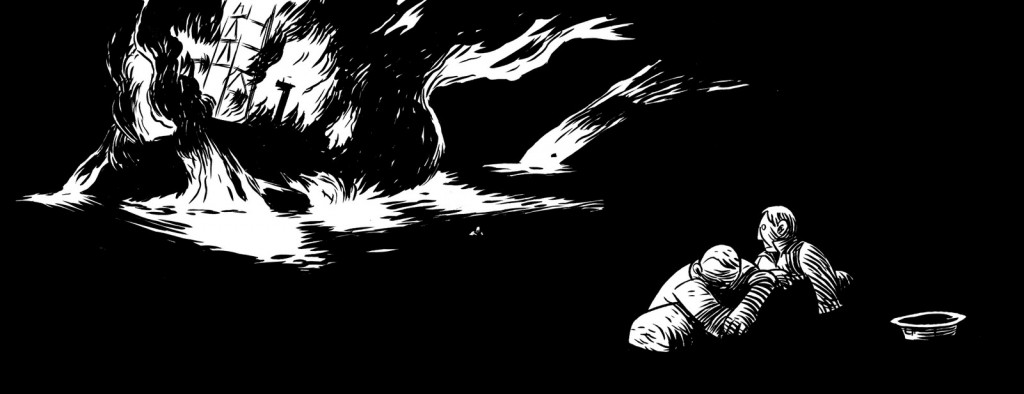by M. Long
What is our situation in the Gulf Coast?
Across the country corporate and state interests have become inseparable. This is inevitable. The politician and the big money-maker get along quite well in the United States. Even millionaires can be quite powerless. Entities with incomprehensible amounts of wealth are the issue.
This vast wealth is generated because private interests are more or less given natural resources by the government. Representational democracy acts as a sham allowing politicians and judges to make it seem as if a majority of the people in a region consented to whatever deal was made. This is what has happened in the Gulf Coast for decades.
As a result, the state favors the interests of wealthy corporations over individual people. This means that the armed forces and police forces are often enlisted in the service of these profit-making giants; this is why BP has command of the U.S. Coast Guard while it is being “investigated” and “regulated.”
The South historically has existed in many ways as an economic
colony of the more industrialized North. From cotton to sugar to oil, this region has produced a great amount of raw product. This has come at great expense to its people and nature, but this region has not seen much of that wealth return.
The Federal Government sells the Gulf Coast to the highest bidder. This is made possible by the complicity of state officials on both sides of the aisle. Some seek to blame the majority’s lifestyles as the root of the problem. This is a smokescreen. We can agree on the necessity of throttling back consumption, but “going green” as the corporations, government, and Hollywood have presented it is based on individual consumer initiatives: “Buy this new light bulb, buy organic, drive a Prius”.
Many people would like to take initiatives like this, but most simply can’t afford it. The “green” product is a status purchase. This popular vision of “going green” has nothing to do with systemic change. Instead it presents BP as “Green”, the Oscars as “Green”, and Al Gore as “Green”. It has nothing to do with making a more sustainable, healthier future for the middle, working, and poor classes. We need systemic change, where the burden is not on the cash-strapped individual but on the corporations and the state who have institutionalized our problems and created pockets of extreme wealth for themselves in the process.
How can we respond to yet another disaster here?
We of the Gulf Coast must organize for ourselves. This requires connecting with others and becoming informed about their efforts. From there, we can look at what’s going on and better see how to help fill in any gaps in the overall effort. The task of a useful grassroots response is to encourage organizing in such a way that all forces make an appeal to one another, through formal or informal channels, and one compliments the efforts of the rest. It’s also important to prevent the co-opting of these various efforts by political parties and corporations.
If the people of the Gulf region had not taken the initiative to survive and rebuild after the storms and floods, we would no longer be here. The BP disaster is not the first crisis that the oil companies and the government have brought upon us. The prolonged and rapid deterioration of wetlands that increased the devastation of Hurricanes Katrina and Rita and the still-useless levee system are direct results of the oil companies and their influence on the priorities of government.
Anti-authoritarian organizing can support the participatory nature of grassroots recovery efforts and bring a certain attitude to the struggle against anyone using the Gulf Coast as a venue of convenience for negligent, destructive, or greed-motivated dealings.
We must end the occupation of the Gulf Coast by BP and the federal and state government that legitimizes their presence while keeping funds from our actual needs. We must have access to BP’s vast wealth to repair all the damage to our region and secure our future, with no concern for BP’s ability to maintain itself as a functional business entity.
Why The Raging Pelican?
The Raging Pelican seeks to aid expression of outrage, criticism, and positive suggestions about this situation unrestricted by political or professional affiliations. In this way, we hope our paper can provide a platform for the mutterings of the Gulf Coaster who, out of fear and necessity, puts on a polite face at the negotiating table.
We want to further the struggle towards popular empowerment in whatever direction it seems naturally to be developing. We have no predetermined box for daily action to fit into, but to create an outcome where we aren’t ignored, walked over, and talked over, we need to interrupt any chain of events that further disenfranchises, exploits, or otherwise destroys the people of the gulf, the wildlife here, and the beauty and health of the natural world.
We promote a diversity of approaches, from the bottom up, to
develop an assertive and self-reliant perspective as part of the long-term project of preserving our region and empowering the people here. We cannot support any proceedings that lead us down the same path as the Alaskan oil “recovery”. We must work not just to save ourselves but prevent the companies and politicians from creating more disasters like this one in other places.
The story of the oil catastrophe and its effects needs to be wrested from BP and its allies, the state and federal government. This is necessary so that they can not hoodwink, divide, buy off, or manipulate us to stop believing what’s in front of our faces. The Raging Pelican is meant to play a part in this effort.
If you live in the deep South, the Gulf Coast, or have ever cared about these places, we are for you and want to hear from you. We all suffer from this. The state and the big capitalists like BP make a game of picking and choosing who has and who has not, who is helped and who is not helped. We cannot pick and choose. No matter who you are, what you look like, how much money you have, or where you are from… If you are in opposition to the current situation, or if you suffer from the current situation, this paper is in sympathy with you.
Share

I’d like to point out something that I have seen very few articles or comments on. I support separation of economics and state very strongly. I am not political it just makes sense to have a balanced system and I have not seen it to any degree in my lifetime. I have not purchased gasoline or anything else from BP since this happened, and I know that I am not the only one protesting them in this regard. However, sales of gasoline and oil are insignificant to BP and other oil companies. The biggest source of income from these corporations is in byproducts from oil, plastics. waxes, polishes and other chemicals make up a good majority of fiscal income for these corporations and smaller corporations who use and sell these products. To successfully protest a parent company such as BP, we must find all the subsidiaries and their suppliers, and protest the entire grid.
word.
I was living in Destin for 7 months. Was infested twice with Staph. I asked Doctors and they would not talk about it. Only after many months of research online, I found what was happening in the Gulf with despersents, the oil, and the lies. I can’t believe what has happened.